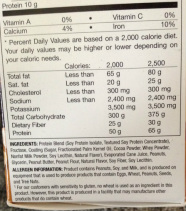 A couple of years ago, on our quasi-annual trip to Hawaii, my husband and I decided to read the book Eating Animals, by Jonathan Saffron Foer. In case you couldn't guess, the book doesn't exactly advocate for an omnivorous diet. Upon learning his wife was pregnant, the author sets out to learn about food so he can answer questions for his soon-to-be offspring. Hilarity doesn't exactly ensue. After reading this (and noting a small world connection to my high school crush's father, who is quoted in the book), my hubby and I gave up dairy for a long time. Completely. It is from this experience that I relate to you the various techniques we found acceptable for replacing dairy products in our home. Am I suggesting you do the same? Not at all. But since the most common dietary irritant of the exclusively breastfed infant is dairy (in mom's diet), I get the please-help-me-cut-dairy-for-my-baby-even-though-I-love-it-more-than-coffee plea on a weekly basis. Step One: Banishment Review all packaged products for the highlighted, bolded word MILK either in the ingredient list or in the allergen disclosure below. Put those items into a special place for your other family members to enjoy and use a large marker/tape to label the item so you do not consume it. Step Two: The Cheese Situation Refuse to eat artificial cheese. Trust me, don't bother with it. Soy cheese is horrific on a good day. Some vegans I know enjoy the Daiya non-dairy cheese made from pea protein, but I think it tastes like expensive plastic. Instead, replace cheese with things that also taste good. Pizza: use no-cheese pesto, caramelized onions, olives, artichoke hearts, and other salt/fat combinations to replace the salt/fat you're missing from the cheese. Also note you'll need to eat more pizza because of the number of calories and amount of fat you're missing. Quesadillas: instead of cheese, use hummus in your quesadillas. Just hummus, maybe some black beans, salsa, peppers, onions, etc. Prepare as usual. It's delicious. Dip: this accidental invention comes courtesy of my bro-in-law who lived at our house for nine months and ate his weight in salsa every week. Combine equal parts salsa and hummus and use as a chip dip or veggie dip. No, it isn't queso, but it is rich and tasty. Sandwich/burger/wrap condiment: try avocado, roasted red peppers, sunflower seeds, olives or other tasty treats. The exception to the artificial cheese is tofutti cream cheese. I'm sure it isn't good for you, but it tastes and feels like dairy cream cheese (and is equally unhealthy). If you're seriously craving a creamy spread on your sandwich, this will do. Step Three: With Cookies? There are lots of delicious non-dairy milks out there. Some are healthy, and some are essentially soda. I recommend having a variety of milks available, from soy to almond to hemp. Note that most non-dairy milks have little protein and are fortified with vitamins (and sometimes sugar). Hemp and soy have the most protein while coconut and almond are tastier. Use some for cereal/oatmeal/baking and others for a latte. Step Four: I Will Scream Avoid the soy ice cream and almond ice cream (I think they're icy and not satisfying) and head straight for the coconut stuff. It costs twice as much and has just as much fat and sugar as the dairy kind, and it tastes just as good if not better. Yogurt is another story. It's hard to find good yogurts, but you can find something that will do if you mix in some granola or fruit. At least we know they have their priorities straight?! Step Five: Family Recipes The most alarming thing we realized when we went dairy-free was how much our cooking and meal planning relied on dairy. Try some new stuff! I've found many good recipes online from sites like ManifestVegan and CompassionateCook Step Six: Dining Out Go ethnic. Try to find some Thai, Japanese, or Kosher food (since they will not mix meat and milk in the same meal, you know you can easily avoid dairy). Take Out! Hope this helps!
1 Comment
 On occasion, I receive correspondence from various people asking me how I know what I know about birth and motherhood, since I have no children of my own. They want to know where I trained and what sort of "hidden agenda(s)" I might have. I take this as a compliment. There is a lot of varied information out there about childbirth, motherhood, fashion, and nutrition. I'm so thankful I don't have to know everything there is to know about those things. I don't know everything there is to know about childbirth and motherhood! And if you've ever met me, you know I'm hopelessly fashionless. My credentials are outlined on my website, if you want to know what all of the fancy letters mean (squat, in fact). So while you're here, please enjoy the laundry as I air out my closet. I believe: The baby will come out. It's amazing, but true. You will not be pregnant with this baby forever, and you can probably give birth vaginally. If your provider says you can't, and you want to, ask lots of questions and/or get a second opinion. The overwhelming majority of the time, a women grows a baby/babies she can give birth to. It does not make sense that we have lived 3.5 million years on Earth by growing babies too big to birth. It's a tight squeeze, and in very rare cases it is not physically possible. We are lucky to have modern medicine and obstetric care. When problems arise, babies come early, mamas get sick, or accidents happen, we are incredibly fortunate to have access to lifesaving procedures, medications, and information. Doulas are superheros. And worth every penny, even if you love your provider, your spouse and your mother and want everyone in the room when you give birth. What's a doula? How do you choose? How do you hire me as your doula? You are not expected to know everything about birth before you have your baby. And if you do, it's a waste of time. You are not going to turn around and deliver the next baby, you just need to know enough to feel confident in your team. A birth class will tell you what you need to know. The internet is for porn. (That's a line from a musical). The internet is not for birth or mothering advice! There are safe places where you can get good, reputable information, and great places where you can network and commiserate about how long it has been since you peed alone. Dr. Google is not your friend. What to Expect When You're Expecting is not worth your time. This book is about being afraid. Being very afraid. The authors forgot that birth is normal and that everyone walking around was born. I recommend these alternatives. Breastfeeding is normal, natural, and possible (and comes with some hurdles). The hurdles are real and without help, it can feel impossible to move forward. Help exists. Learn about it. Please ask me. Everyone is trying to sell you things, because you're part of a "market." For instance, I would like you to come to my classes. Other people want you to buy things not because you need them, but because they are selling them. This includes me. You don't need prenatal yoga. You don't need a crib skirt. Right? Boobs and a carseat are the only things you actually need before baby comes. If you're pregnant, you're halfway there. You can buy things later, I promise. Motherhood isn't all roses and rainbows. Everyone has a different journey to motherhood, with different baggage. You do actually need Mom & Me yoga to form a community where you can remember that you're doing everything right (even when you do something wrong). There are bad mothers out there, but you're probably not one of them. Everyone tells me, "I'm such a bad mother!" Then they talk about the time they put junior in mismatched socks, or turned their back and he rolled off of the couch, or gave him formula. Everyone makes mistakes, and mistakes do not make you a bad mother. You are beautiful. Yep, you. Even if you're covered in spit up or your ankles are as wide as your hips. Mama lions are amazing and so are you. Rawr. That's my agenda. I reserve the right to amend it at any time. What did I miss?  Yep, that's a gorilla! I know what you are thinking. I spend most of my time telling you how normal birth and breastfeeding are, and now it sounds like I'm telling you that you can't go it alone? I'm speaking out of both sides of my mouth, and I mean both sides whole-heartedly. Breastfeeding is totally natural, and you have all of the plumbing you need to breastfeed your baby. However, humans are social creatures who don't do well without connection, emotional support, and an extra pair of arms. Even my second-cousin Sven* who lives on a boat for months at a time eventually relents and asks for help. My favorite story that illustrates this point is the story of a gorilla who had never seen anyone breastfeed. She was utterly helpless when her first baby was born, and the zoo keepers had to support her and supplement her baby. So when she became pregnant again, the zoo asked breastfeeding mamas from La Leche League to come and breastfeed their babies where she could see them. They did, she learned, and by the time her second baby came she knew exactly what to do. Here are the ways your breastfeeding support person can help you:
Check out my upcoming Breastfeeding Basics classes, where your support person can learn all the tricks and tips they need in 2.5 hours. *Name and details changed to protect the innocent.  My BFF's husband, Brian. Holding a walnut. If you're expecting a baby or have a new baby at home, you might feel slightly overwhelmed? No? You might feel like it is imperative that you know absolutely everything about pregnancy, breastfeeding, motherhood, immunizations, daycare, and kegels? I know these are understatements, because every time I meet a new mama or a mama-to-be, I see a wild-eyed, information-starved, overloaded woman who just wants to know everything. I can relate to the overwhelm and the constant drive to learn more. A few years ago I worked as a patient advocate for clients living with HIV, and I remember frantically searching the internet for answers, calling pharmaceutical reps so that I could confirm suspicions before confronting doctors, and literally standing in the doorway to keep a doctor in the room until he gave me what I wanted: one more test for my client. This is the Mother Lion behavior, a true testament to one's willingness to find their voice on behalf of someone else. Are you thrilled about being a mother lion? I'll wager you'd say half yes, and half no. And you're right on target. I'm about to give you the skills to be the mother lion on behalf of your child and for your own health as well, and it thankfully involves little internet research, bargaining, bribing, or accusations of wrongfully detaining a physician against his will. Which may or may not be a crime in Colorado. I recently took a training from CAPPA to become a certified lactation educator, and during that training I learned a very important acronym that sums up exactly what you need to know. Because I'm afraid of intellectual property and all that jazz, I've modified it a bit to become my own. CAPPA encourages clients to use their BRAIN when they must make a medical decision, so I'll recommend you ask BRIAN. My version comes with a handy cop-out, should you ever need to leave the room. Instead of saying, "I'll have to consult my brain" you can easily say out loud to yourself or to your partner, "I'd like to run this by BRIAN." Hint. Hint. When confronted with a medical decision (someone suggesting a procedure, medication, or other treatment), ask BRIAN. Well, BRIAN E. And remember, if there are two patients involved (you and baby) make sure to ask the question for BOTH of you. Often mamas defer to what is healthy for baby without asking what she might experience, too. If you want your baby to have the best care available, you must make sure your baby has a mother well enough to deliver that care! Benefits. What are the benefits of this treatment? This is something the person will likely list for you automatically, but occasionally they do not articulate the benefits because they believe the treatment to be the best option out there, or possibly accept it as common practice. No harm in getting the skinny (with sources, if you're hesitant or want to do your own research). Risks. What are the risks of using this medication or treatment? This is also something they are likely to disclose, but not always in conversation. Usually these are the items listed on a release waiver, informed consent paper, or literature from the manufacturer of the medication or treatment. Intuition. What does your gut say about this treatment? This is why you might need a few minutes away from the person offering the treatment so that you can gut-check. Does your gut check matter? Only to you. This isn't some wacky hippy yoga instructor gobbledygook. This is actual science, from a medical anthropologist. People must believe that the treatment/medicine they will take can work. Even clinically tested medications do not work all of the time, and they work less well and less often if the patient has no faith in them. You will actually know how you feel instantly, but it might take you a little while to articulate how you feel. Give yourself a little time, if you can (see N). Alternatives. Ask what other possibilities exist besides the recommended course of action. Perhaps there are a few that have their own benefits and risks, but if you'd like to be an informed consumer, ask for the names of other medications or treatments so that you can do a little of your own research. This is also a great time to ask the provider why they would select the option they are recommending instead of these procedures. Sometimes it is because they believe the course of action is the best for you, and sometimes it is because they are more familiar with what they are suggesting. If their answer is "I don't feel comfortable performing that procedure myself," you probably don't want them to perform it, either! That doesn't mean the procedure itself is inherently flawed, it may mean you need a referral to someone else. Nothing. What would happen if you took no action? Are there risks for waiting to do this treatment or start this medication? When will the window of opportunity close? Expert. This is my bonus addition. I know it makes Brian a little tougher to remember, but you can write it on your hand if you must! Ask the person who is suggesting this medication or treatment to refer you to an expert on the topic. Even if they are an expert, there is nothing wrong with a second opinion. Now, to play through in two FUN scenarios to drive the point home. Pregnant mama is experiencing lots of discomfort during her early labor. Her nurse suggests she try taking a shower. What are the benefits of taking a shower? What are the risks of taking shower (to me AND to my baby)? What does my gut say about a shower right now? Are there other things we can do or medications we can take? If I don't feel like taking a shower now, will I be able to take it later? What might limit my opportunity to do so? BONUS: Is there someone who is familiar with pain relief techniques that I can speak with? New mama is concerned about how much her baby is eating. Her pediatrician suggests offering baby a bottle of formula once a day. What are the benefits of using formula? (for me and the baby) What are the risks of using formula? (for me and the baby) What does my gut say about using formula? Are there other alternatives to using formula? What would happen if we do nothing? How will we know when we need to do something or come back and see you next? BONUS: Is there someone who is familiar with infant nutrition or breastfeeding who I can speak with? You're on a wonderful journey to be a mother, and no one will expect you to turn around and deliver the next baby! Your job isn't to be an expert about everything you could possibly confront on this journey. Every time you meet with a doctor, midwife, therapist, nurse, or practitioner of any kind, put BRIAN E. in your bag. It will save you from Doctor Google and information overload.  I recently watched the documentary series "More Business of Being Born" and it made me think yet again about how birth begins. Do you know? Let me explain. Your body is working very hard to support your baby right now. Not only have you grown an entirely new organ (the placenta) you are getting ready to make milk for when baby is born. You might feel excitement about the upcoming birth, or a little trepidation that you aren't ready and can't quite keep a good handle on time. There is nothing wrong with you! As luck would have it, you're not supposed to decide when your baby is born. You're not supposed to have ANY IDEA! Women in my class are frequently frustrated when they don't "feel" any different once they hit the magical 40 week "due date" marker. The dirty secret? Women have never known (and neither have men). In the "old system" (and by old system, I mean the one used from 3.3 million years ago until about 100 years ago) went like this: Miss a period? Count nine moons. (yes, actual moons. Like full moons. In the sky). Sometime between the ninth and tenth moon, you'll have a baby! I'm sure that ancient and not-so-ancient women all gazed at the moon and cursed the sky when they started to feel really uncomfortable. But they had only one option: wait. So if you don't decide, who does? There is something on the border of science and magic that happens when baby is ready to be born. Baby moves into a good position, pressing his head against your cervix. Some complex chemical changes start to happen in his body once he is ready to start breathing. Those changes signal your uterus to start contracting, and once things really get moving your water may break and baby will slide down even further. Under normal circumstances, baby decides, mama goes into labor and all is well! Occasionally, there are unusual circumstances, like an illness that mama has or some signs of fetal distress that warrant an earlier birthday. Thank goodness we live in a time when we have so many options when something goes wrong! So what's the deal with induction? You probably have friends who have had their labors induced for a variety of reasons. Some doctors will offer an induction even before your due date, and for a mama who is uncomfortable, this can sound like a great option. However, labor that is chemically induced can cause incredibly intense contractions that are very painful for you and baby. You can get an epidural, but your baby will not get any pain relief from it. It is worth asking some questions before you decide that an induction is right for you. 1. How will an induction affect my labor? I've heard it can make it much more painful and possibly more dangerous for me. What are your thoughts? 2. What are the possible effects for my baby? I've heard that babies who aren't ready to be born have more difficulty breathing and breastfeeding, and that the induction process is more traumatic for my baby. 3. Is there a medical reason why I should consider an induction now rather than waiting until I am 42 weeks? 4. I've heard that there are many ways of inducing labor. Can you please tell me about my options? This is a great time to use your B.R.A.I.N.: What are the BENEFITS of induction (for me and baby)? What are the RISKS of induction (for me and baby)? What are the ALTERNATIVES to induction? What does MY INTUITION tell me about this decision? What would happen if we were to do NOTHING right now? When would we need to decide? Want to read more? Check out the Mayo Clinic's article about Induction.  Image courtesy of Tratog/ FreeDigitalPhotos.net If you're a breastfeeding mama (or if you're about to be one) you've probably heard lots of commentary about breastfeeding. This commentary probably includes: - Where - When - How Long It probably also includes the word should. I hate the word should. Let me be clear, I have some opinions about breastfeeding just like everyone else does. You probably have some as well. But the idea that you should do anything should be a red flag that you're about to get hit by someone else's values. Rather than taking someone else's values as your own, I recommend understanding why they hold those values and how you can best formulate your own. May I present some facts surrounding the following areas so that you may make an informed decision about feeding your child? Where: You are legally allowed to breastfeed your child in any place where you have the right to be*. This includes park benches, the zoo, restaurants, places of worship and airplanes. This does not include private property (because anyone can tell you that you no longer have the right to be on their property) and men's bathrooms. That's a short list. When: Oh the SHOULDS about when! May I suggest whenever baby shows signals that she's hungry? Before she has a melt-down? Whenever you'd like? As you may recall from labor, baby lives in a space beyond time. As convenient as it might sound to schedule her feedings at regular intervals (and there are times when this might be appropriate to make sure she feeds often enough, per the recommendations of an IBCLC), most babies will simply make it clear when they are hungry. They are spending a lot of time growing, developing, learning new skills, and experimenting with new tasks. This means their caloric needs can vary from day to day and hour to hour. Are you hungrier on days when you do the incline? How would you feel about waiting for dinner with no snacks?? How Long: Just like the when, baby knows how long she needs to nurse at each feeding. More often, people comment on how many weeks, months, or years you should nurse each baby. Many factors play into the duration of breastfeeding, like medications mama might need to take, her employment, additional babies, and other factors. Baby expects to breastfeed until she's able to feed herself at the table and beyond. Did you know that the average age of weaning world-wide is more than 4 years old? The American Academy of Pediatrics recommends six months of exclusive breastfeeding (this means no formula, water, juice, cow's milk, or anything other than prescribed medications) and sustained breastfeeding for at least 12 months. Does that mean you should breastfeed your baby for 12 months? No, it does not. But it means that it is worth considering why this recommendation exists and understanding the costs and benefits of sustained breastfeeding. I'll share some of the reasons why in an upcoming blog. HOMEWORK: What are your values about breastfeeding? What are your goals? And why? *In Colorado as in most states. There are a few states with slightly more stringent laws. 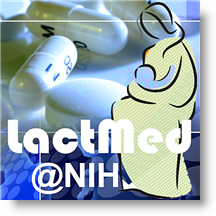 Whether you are currently pregnant or whether you are breastfeeding a child, you need to think carefully about all herbs and medications you put into your body, because you're also putting it into your baby. Medications and herbs are more complicated when you are pregnant, because baby gets them in a different formulation than you do. When you are pregnant, your blood meets baby's blood at the placenta and nutrients and medications cross from you into baby. Some medications easily cross the placenta into baby's blood, and some do not. If a medication crosses easily, it might be overwhelming on baby's developing kidneys and liver to process the medication. This is why it is so important to have a conversation with your provider prior to taking any herbal or pharmaceutical medication. Breastfeeding is a different story, because breast milk is made differently. You make milk from nutrients and materials in your blood supply, which could possibly include herbs and medications. However, now baby will be getting this through baby's stomach lining and intestines rather than directly into the blood via the placenta, so the chart of medications is different. Is the herb or medication easily absorbed via the digestive tract? Is it a medication that is given to infants? And at what level will it appear in the baby? If the last two paragraphs have made you throw your arms up in the air and say, "Forget it!" take another breath. The excellent news about breastfeeding and medications is that there is a FREE app that is updated daily with information learned through clinical trials and reports from mamas and babies, and this is a great resource for you and your physician. Even if you are still pregnant, it is worth getting this app and looking at all of the medications your currently take to see if there is a better alternative while breastfeeding. LactMed is free and updated every time there is new information. It includes the safety information, guidelines, links to research, and possible alternatives for almost every single medication out there. It should be used as a resource, not gospel, so be sure to use it as a supplement to a conversation with your provider. The other great news: there are very few medications which are considered dangerous enough that you should stop breastfeeding. Others may recommend taking the medication an hour or two prior to breastfeeding. Your physician may not be up to date on the most current research, so if they advise cessation of breastfeeding due to a medication, it is worth consulting this app and talking about alternatives. If you are faced with taking a medication that you must take that is incompatible with breastfeeding, talk with your physician and an IBCLC about the possibility of breastfeeding once the course of medication has completed. You may be able to pump and discard your milk for the brief stint that you need to take the medication and then return to breastfeeding later on. Simply stopping will make restarting much more difficult in the future, so discussing your best options and your breastfeeding goals with an IBCLC is critical! What is an IBCLC? Check out my post The Breast Experts 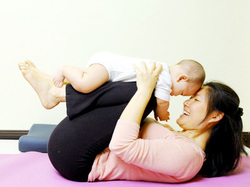 So many mamas eagerly join me for prenatal yoga. Pregnant mamas immediately recognize the importance of self care now that they are pregnant, even if self-care was not a part of their vocabulary or their week prior to pregnancy. But once baby is born, yoga takes a back seat. And it should. I believe, and many indigenous cultures agree, that mama and baby should have some sacred alone time for the first several weeks postpartum. Now, most mamas I know don't spend six weeks alone with their babies, because it isn't practical or appealing. After six weeks, yoga can be a great addition for a number of reasons: Get OUT of the house: getting out of the house is a lot more complicated than it used to be, but that isn't a good reason to just stay home. M&M yoga gives you an appointment to shoot for where walking in several minutes (or even half an hour) late is perfectly acceptable. Everyone understands the blowout, the extra long nap, or the grand schlep to and from the car. Reality check: being home alone with an audience of a newborn (or two) can feel isolating for some mamas. Rather than consulting Dr. Google about normal behaviors for mama and baby, M&M yoga can give you a weekly view of other mamas and babies. If you're concerned about rolling over or possible postpartum depression, M&M yoga can offer a nice gauge. Breastfeeding trial run: didn't show off The Ladies in public much before baby was born? Not sure how you will feel about it? Breastfeeding is welcome during and after M&M yoga class so you can feel confident that you are in a peer group with other women who are doing the exact same thing. In fact, post-practice breastfeeding time is one of the best times of M&M yoga, especially when I bring snacks! Date with baby: if you spend all day with your baby, you probably don't schedule dates with them. And if you're away from baby for a good portion of the day, dates are a great way to connect. When you have a date with your baby, your perspective shifts from caregiver to companion. You get to play, enjoy their company, and create a very healthy dynamic in your relationship that will last your entire life. Well, and YOGA: rather than jumping straight back into vigorous exercise, M&M yoga is designed for the new mama whose body is still changing. We take special care to stretch muscles that ache from holding baby or awkward breastfeeding holds, build low body strength, and pull the tummy back to a healthy position. There's a little quiet time at the end, too! Are there benefits I'm missing? Please let me know! Sign up for my new mama newsletter for more details. Class schedule here. 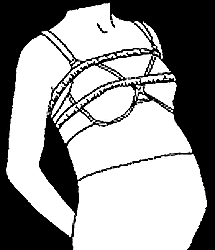 Photo: ABC Maternity Do you get the feeling that everyone wants to talk about your breasts? When it comes to pregnancy and breastfeeding, there are a lot of experts out there who can offer assistance in all areas of breast health. There are also people out there masquerading with credentials that don't indicate much actual knowledge. Here's your breast expert primer: Breastfeeding Specific Folks: CLE: A Certified Lactation Educator is someone who knows quite a bit about normal, healthy breastfeeding and can offer education about how healthy mama and baby can give breastfeeding a go. They also offer training about pumping, going back to work, tandem nursing, and common complaints. A CLE is a great first-line of defense when you're not sure where to go with a question because they agree to a professional code of non-judgement. Think of this person as a personal trainer for breastfeeding. La Leche League Leader: A LLL Leader is a woman who has breastfed at least one baby for 12 months and has significant training and education about supporting other women. While some education is part of the role of a LLLL, the other aspect is support. Breastfeeding can be emotional as questions and concerns arise, particularly as it relates to family support of breastfeeding, questions about breastfeeding in public, and cultural considerations. This is a volunteer position filled by women who have a strong passion for breastfeeding. Think of this person as a life coach for breastfeeding. IBCLC: An Internationally Board Certified Lactation Consultant is someone with two years of academic training and thousands of hours of hands-on experience working with women with breastfeeding problems. Some are employed by hospitals and breast-pump rental centers, and others work as independent contractors. They specialize in difficulties, whether baby was born early, there are medical concerns, multiple babies, infections, or concerns about supply. They know how to support women with medical problems like engorgement, mastitis, hormonal challenges, a history of breast surgeries and even adoptive mothers who want to breastfeed. Think of this person as a physical therapist for breastfeeding. Birth Professionals: RN, LPN, BSN, MSN, NP, PA, MD, DO: These are nurses and doctors with varying levels of medical training. Unfortunately, breastfeeding isn't covered very well in nursing or medical school. Unless you know where your nurse or other practitioner trained, you don't know how much support they may offer for breastfeeding. If you're not sure, always consult an IBCLC as well. Formula companies often offer professional development for these professionals, but because they are selling a product that is not consistent with exclusive breastfeeding, they may not teach techniques that could help preserve or work towards exclusive breastfeeding. CNM: A certified nurse midwife should be a better bet when it comes to breastfeeding information and support, because there are specific courses in CNM school that support healthy breastfeeding. CPM, ASM, BSM, MSM: A direct-entry midwife also has more training when it comes to breastfeeding as all accredited programs for midwifery in the US require breastfeeding training and support. Other Professionals: PPD: Postpartum Doulas are trained in supporting normal breastfeeding as a part of their practice. There are two organizations who offer this credential, and both require significant study of healthy breastfeeding. Bra fitters: Ok, you might laugh, but you're going to need some "support" when it comes to your changing body. While you can simply go to a department store and buy a nursing bra or top, this is one time in your life when it would be very helpful to work with someone. I know if you live in Colorado Springs you can get fitted at Baby Cotton Bottoms and only need two bras to take you from 16 weeks pregnant through nursing! A couple of quality bras (and possibly some nursing pads) can be worth the price when they keep you as comfy as possible. 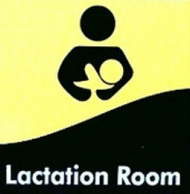 If you think this post is about poop, then you're half-right. But that's not the most important half. In the last three weeks I've learned more about breastfeeding than I ever imagined possible. For instance: did you know that there is no research-based evidence that nipple creams are effective? Or that there are federal laws prohibiting the re-use of a personal breast pump? Or that a galactagogue is not an alien species? Well, now you do. So what of this is relevant to soon-to-be mamas? Well, a little bit of all of it. Here are some of my picks of relevant breastfeeding bits that you may not have known, along with some that perhaps you already knew. Breastfeeding is enjoyable: sure, some discomfort in the first two weeks is normal as you and baby figure out how to latch on and get things going. But after that, most mamas find that they enjoy the bonding experience because the act of nursing releases oxytocin, the love hormone. That's handy. Pumping, while great, doesn't offer the same neurological benefits, which is why women rarely drive off into the sunset with their pumps, nor do they pay for them to go to college. Nipple pain and engorgement are not normal: you might hear that these two painful conditions come with the territory, but that is as true as saying that lost luggage is the norm. Sure, it happens to a lot of people, but you don't need to ignore it and should seek help from a lactation consultant* if you feel either of these coming on. Usually both problems are an easy, quick fix. Success is something you get to define: so get on it! If you're interested in giving breastfeeding a try, talk to someone like me or another lactation educator. All CLE's trained by CAPPA will help you determine what success means to you and help connect you with the resources you need to meet your personal definition. No judgement. It is incredibly likely that you will provide all the milk your baby needs. A lot of companies will send you messages like "in case you don't make enough/your milk isn't good enough," but that is because they want you to buy what they are selling. Your milk is made on demand and offers the perfect balance of everything that your baby needs. Babies will start to want iron-rich foods at about six months of age, and that's when they will normally need additional food. When in doubt about supply or supplementation, always talk to an IBCLC. Don't trust everything you read on the internet (including this). Why? Because you may drop everything to run out and buy cabbage leaves when all you need is a cold compress. There are lots of old wives tales about breastfeeding, and some of them are accurate, some are harmless, and some are incredibly dangerous. I like La Leche League International for easy to read and access information. Be wary of the resources you use, and consider their motivations. Are they trying to sell you a product? And does that product involve you breastfeeding more or less? Exclusively breastfed babies' $#it doesn't stink. This was the most mindblowing of everything I learned. If you need proof, this is a great time to explore chat rooms and facebook groups. Babies who drink only human milk make poop that smells a little like buttermilk and is easy to wash out of cloth diapers and clothing. Now that's a party trick I can get behind! *in an upcoming blog post I'll explain all of the different professionals who specialize in breastfeeding so you know the lingo. I always recommend an Internationally Board Certified Lactation Consultant (IBCLC). |
About meI'm one of those people who loves making your life easier (and I believe in you). I am an experienced registered prenatal yoga teacher and a lactation educator. Want more? My monthly newsletter might be for you.
Archives
April 2014
Categories
All
|
 RSS Feed
RSS Feed
